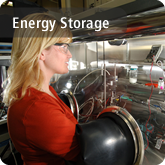Photovoltaic System Evaluation Laboratory (PSEL)
PSEL fact sheet
The Photovoltaic Systems Evaluation Laboratory (PSEL) provides expertise and test support within several facilities and outdoor sites for evaluating PV and other distributed energy hardware. It includes the following capabilities:
- PV systems evaluations and optimization
- field testing of arrays and systems in collaboration with system integrators
- performance testing for modules, arrays, power inverters, charge controllers, and batteries
- diagnosis of module reliability issues with manufacturing consultation
- complete performance characterization of PV cells and photo sensors
- calibration of PV reference cells, reference modules, and solar instruments
- performance measurements on multiple, interacting distributed energy sources
- on-site education and training on the attributes and limitations of photovoltaic and other distributed energy systems

Distributed Energy Technologies Laboratory (DETL)
DETL fact sheet
The Distributed Energy Technologies Laboratory (DETL) is an extension of the power electronics testing capabilities of PSEL. DETL is configured as a 480V, 3-phase microgrid with interconnections to the utility grid and to various distributed energy resources including PV inverters, microturbines, fuel cells, reciprocating engine-generators, and electrical energy storage systems. DETL provides expertise and test support to perform the following functions:
- Grid-connected performance evaluations (e.g., efficiency, distortion, power factor, response to abnormal grid conditions)
- Off-grid (stand-alone) performance evaluations (e.g., transient response, compatibility with various load types, voltage and frequency regulations)
- Specialized tests (e.g., radio-frequency emissions, “non-islanding inverter,” interactions of multiple sources on a common microgrid, surge tolerance)

Microsystems and Engineering Sciences Applications (MESA)
MESA Fact Sheet
Sandia’s primary mission is ensuring the U.S. nuclear arsenal is safe, secure, reliable, and can fully support the Nation’s deterrence policy. Employing only the most advanced and failsafe technologies to fulfill our responsibilities as stewards of the nuclear stockpile, Sandia is responsible for the development, design and maintenance of approximately 90 percent of the several thousand parts found in any given weapon system, including radiation-hardened microelectronics. In support of this mission, Sandia National Laboratories has a significant role in advancing the “state-of-the-art” in microsystems research and development and in introducing microsystems into the nuclear stockpile. Microsystems incorporate radiation-hardened microelectronics as well as other advanced components such as micromachines, optoelectronics, and photonic systems. The MESA Complex is designed to integrate the numerous scientific disciplines necessary to produce functional, robust, integrated microsystems and represents the center of Sandia’s investment in microsystems research, development, and prototyping activities. This suite of facilities encompasses approximately 400,000 square feet and includes cleanroom facilities, laboratories and offices.

 ECIS Highlights
ECIS Highlights













 RSS
RSS Google+
Google+ Twitter
Twitter Facebook
Facebook LinkedIn
LinkedIn YouTube
YouTube Flickr
Flickr

